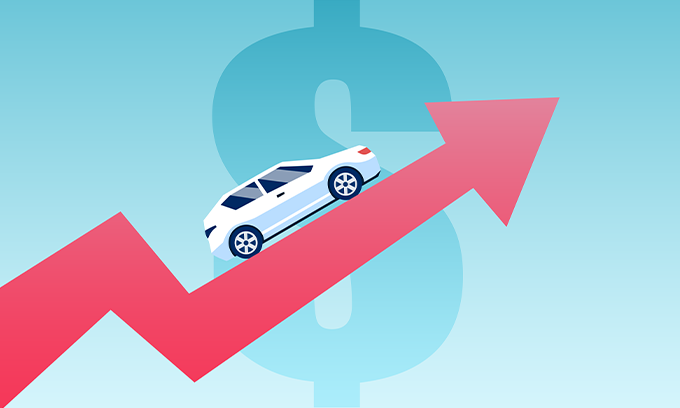KEY POINTS
- A car insurance premium refers to the price you pay for a car insurance policy to be active.
- The price of car insurance is based on a wide range of market factors, which means even as your car’s value depreciates, your premiums can still increase.
- There are steps you can take to reduce the cost of your car insurance premiums.
Car insurance can provide financial peace of mind in the event of an accident. If your car is damaged, or if you damage somebody else’s vehicle or property while driving, car insurance can help cover the cost of repairs.
Usually car insurance premiums increase each year, which can seem counterintuitive since the value of a used car typically decreases as it ages.
So why do car insurance premiums go up, and are there steps you can take to keep them as low as possible?
Why do car insurance premiums go up?
Multiple factors affect the cost of car insurance, which can lead to annual premium increases. These include:
General inflation: Since the late 1960s, Australia has experienced consistent price inflation. As the costs of repairing or replacing damaged cars increase, so do premiums.
Extreme weather events: Large-scale floods or fires can lead to a steep rise in car insurance claims, which can cause insurance providers to increase their premiums to cover the costs.
Changes to insurance providers’ general risk assessments: Insurance providers are constantly reassessing risk factors, from crime to climate. Depending on where you live, this means your premiums can increase due to perceived increased risks.
Changes in personal details: As mentioned above, drivers’ ages can affect policy costs. Moving house, or changing how you use your car, for example starting a new job that involves a long commute, can also cause the cost of your insurance to increase.
What is a car insurance premium?
A car insurance premium is the price you pay for car insurance, which provides financial compensation should your vehicle incur damage, or if you damage another person’s property or car while driving—depending on the type of car insurance policy you have.
Car insurance providers calculate the size of their premiums based on factors including car values, cover levels and drivers’ risk profiles:
The car you drive
The car you drive has a big effect on the cost of your premiums. Obviously, a new, expensive, powerful European sports car is going to be more expensive to insure than a 10-year-old family runabout. This is due to most car insurance providers using a vehicle’s market value when calculating the total amount it will be insured for.
Any finance owing on a car, along with customisations or modifications, can also increase your premiums.
Your level of cover
Aside from Compulsory Third-Party (CTP) insurance, which is mandatory for all registered vehicles in Australia and provides financial cover if the driver injures someone in a road accident, there are three main categories of car insurance:
- Third Party Property Damage: Usually the cheapest level of optional car insurance, Third Party Property Damage provides financial cover for damage caused to another person’s property in an accident, such as their car or home.
- Third Party Fire & Theft: Typically mid-priced policies, Third Party Fire & Theft covers a policyholder’s car if it’s stolen by thieves or damaged by fire, while also providing the same coverage as Third Party Property Damage.
- Comprehensive car insurance: The most expensive level of car insurance, comprehensive policies cover accidental damage to a policyholder’s car, regardless of who is at fault, as well as providing the same coverage as Third Party Fire & Theft.
Drivers’ risk profiles
When setting the price of a policy, a car insurance provider will calculate a customer’s risk profile, to assess their likelihood of making a claim. And, the greater the risk, the higher the premium price. Risk profiles are based on factors such as:
- The age and gender of a car’s listed drivers: Younger drivers are generally deemed a higher risk, especially males under the age of 25, and therefore incur higher premiums. Seniors and less experienced drivers, too, can pay higher premiums.
- Where the car is parked: If a car is parked in a locked garage in a quiet suburb, it’s generally deemed a lower risk to insure than if it’s parked on a street in an urban area with a higher crime rate.
- Driving/claims history: If you’ve committed any serious driving offences, or made car insurance claims in the past few years, these can adversely affect your premiums.
- Save 15%^ on your first year’s premium when you purchase a new Car Insurance policy online.
- 24/7 Phone & Online Claims.
- Budget Direct - Insurance Solved.
- Insurance that's a bit more you-shaped.
- Canstar’s 2025 Most Satisfied Customer Car Insurance – NSW, VIC, SA
- Lodge a Claim 24/7 with our Advisors
Why do car insurance premiums differ between insurance providers?
Just like any other product, two different brands could be selling the same type of product at different prices. It’s the same in car insurance, as providers tend to determine their premiums based on specific factors such as:
- The provider’s business and claim related costs
- The claim history of their customers
- General insurance risk statistics.
Price isn’t the only consideration when it comes to car insurance though. It’s also important to consider the coverage you’re receiving from a policy and whether it represents good value for your money.
My car’s losing value, so why is my premium going up?
Unless you have a collectable classic or vintage car, the market value of your vehicle will typically depreciate as it ages. However, you may find that your car insurance premiums continue to rise. This is because the purpose of car insurance isn’t to simply replace your vehicle like for like.
All levels of optional car insurance, from third party through to comprehensive, cover damage to other people’s property and vehicles. Also, most car insurance claims aren’t for the replacement of written-off vehicles. Instead, they are for repair costs, which are subject to inflationary pressures.
So along with the other general reasons why premiums tend to increase, as listed above, despite the value of your car depreciating annually, you can expect your premiums to head in the other direction.
How will a car insurance claim affect my premium?
Making a claim on your car insurance does have the potential to affect the premiums you pay. If you’re found to be at fault for damages caused by a motor vehicle accident, your premium may increase to reflect your higher risk rating. You could also lose your no-claim bonus/discount—if you have one.
How can I reduce my car insurance premiums?
There are steps you can take that could potentially lower the price of your policy and help you save on your car insurance:
- Change your level of cover or policy features, which could include removing extras you don’t require, such as excess-free windscreen and window cover or roadside assistance, increasing your claim excess, or changing how your vehicle is valued by insurers (e.g. changing from an agreed value with your insurer to the vehicle’s market value).
- Improve your security by parking your car overnight in a locked garage, or fitting it with anti-theft systems.
- Paying your premium annually rather than monthly, as paying in instalments usually incurs a surcharge.
- Use your car less, for example by using public transport for your commute.
- Bundling your car insurance with other policies, such as home and contents insurance, as this can often earn you a multi-policy discount depending on your provider.
- Compare car insurance providers. If you’ve not compared prices between different providers, you could be missing out on a better deal. You can compare car insurance with Canstar.
It’s important to read any relevant policy documentation, such as the Product Disclosure Statement (PDS) and Target Market Determination (TMD), for any car insurance policy you are considering.
Cover image source: FGC/Shutterstock.com








